Europeans Are Less Trusting of Their Food Now, and Care Less About Sustainability Too
6 Mins Read
Fewer people in Europe have trust in their food system and are taking sustainability into account, and the lack of progress in improving their diets is “worrying”, according to a new report.
European consumer confidence in the health and sustainability credentials of their food remains low, and that has impeded the progress towards better eating habits and a more resilient food system, a new report by European research hub the EIT Food Consumer Observatory has found.
The study surveyed 19,624 Europeans from 18 countries to find that less than half (45%) have trust in the food they eat, in terms of taste, safety, health, authenticity and sustainability (though this is up from 44% in 2022). Even fewer (43%) have confidence in food technology.
While Europeans are slightly more confident that the food they eat is safe (53%) and tasty (59%), only 36% think it’s sustainable and 44% believe it’s healthy.
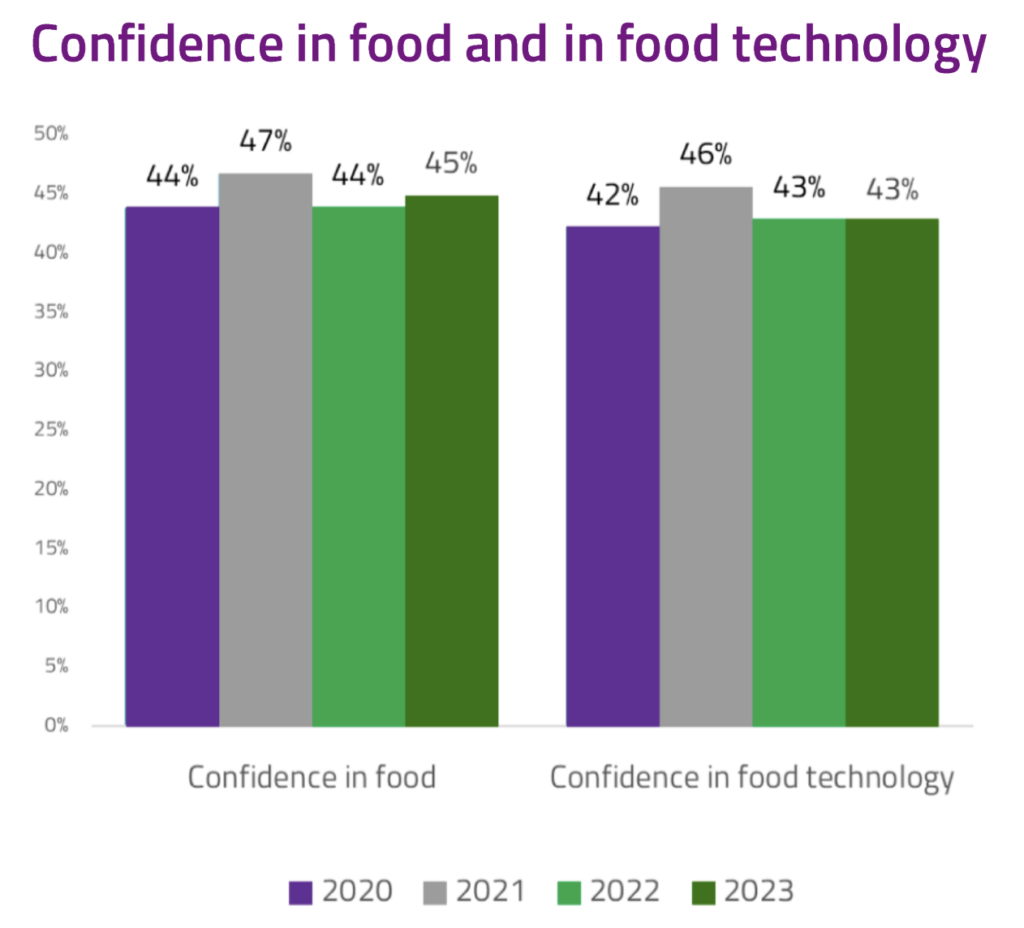
Confidence in food and food tech has been low for years and is correlated to openness to trying new food (which dipped to 34% in 2023), and EIT Food suggests that people who are the most conservative in their food choices are also the ones whose diets need the most attention. This is because only 14% of people who rarely choose healthy products and 15% of those who pick sustainable ones are open to food innovation.
“Consumers need to be able to trust that the food they eat is both good for them, and good for the planet,” said Klaus G Grunert, lead of the EIT Food Consumer Observatory. “If we are to support people to make long-term changes to how they eat, we need the food sector to work with consumers to provide better information, options and access for diets that are healthy, nutritious and sustainable – while being affordable and inclusive for everyone.”
Europeans are turning away from sustainability
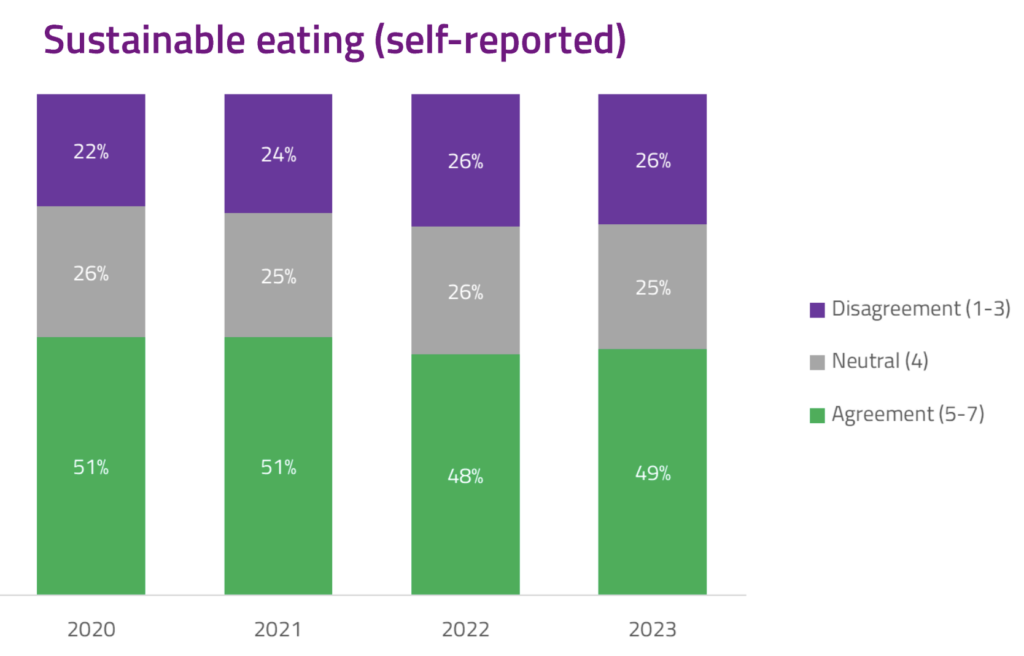
While 78% of Europeans intended to lead a sustainable lifestyle in 2020, this dropped to 71% in 2023. Meanwhile, the number of people who don’t want to live sustainably has increased from 8% to 12%.
Things are bleaker when it comes to food choices – only 49% of respondents take sustainability into account when making food choices, up from 48% in 2022 but down from 51% in the two years prior. The gap between the intention to live and eat sustainably points to the need for greater consumer education in achieving a planet-friendly diet.
Similarly, the intention to eat healthily is also waning, dipping from 60% in 2021 to 56% in 2023. However, that hasn’t impacted people’s choice of healthy foods, which was up by 4% last year. This means there’s no attitude-intention gap with health – more consumers take this into account when making food choices (60%) than those who state their intention to do so (56%).
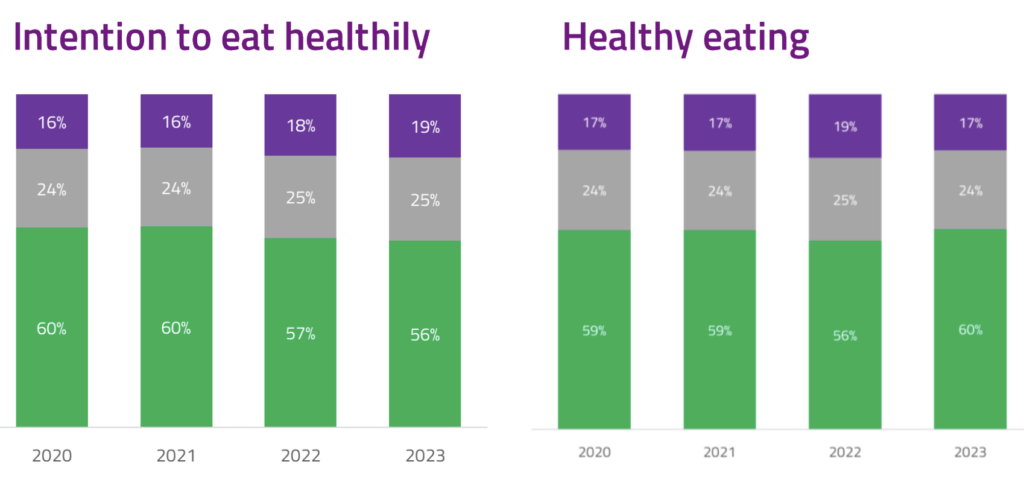
The report suggests that this could be because there’s a general awareness about what is considered healthy and unhealthy food, making it easier to incorporate the former into diets. This doesn’t seem to be the case with sustainability, where Europeans are finding it harder to establish what such food looks like.
People with a lower education, those without dietary restrictions, youngsters, men and consumers living in a single household are least concerned with both sustainable and healthy diets. But there’s a link between the two, with most consumers eating sustainably also eating healthily, and vice-versa.
Food tech neophobia engulfs Europe

New products, ingredients and tech can help build a healthier and more sustainable food system, according to the report, but the topic of innovation is often met with distrust and scepticism in the continent.
When consumers think of new ways to produce foods, they think of circular, organic, natural or homegrown methods – not high-tech solutions. This is despite alternative protein startups gaining steam in the continent and coming up with novel foods that harm the planet much less and aid the body much more. But it’s unsurprising given that only 27% of Europeans believe vegan analogues are better for the climate, and 57% feel they have a worse impact, according to a separate study by EIT Food in February,
However, younger consumers are more open to new innovations than older ones – but they’re also the people with the least healthy and sustainable diets. Reaching this demographic, therefore, may prove to be the catalyst for a better food system.
Who do Europeans trust in the food system?
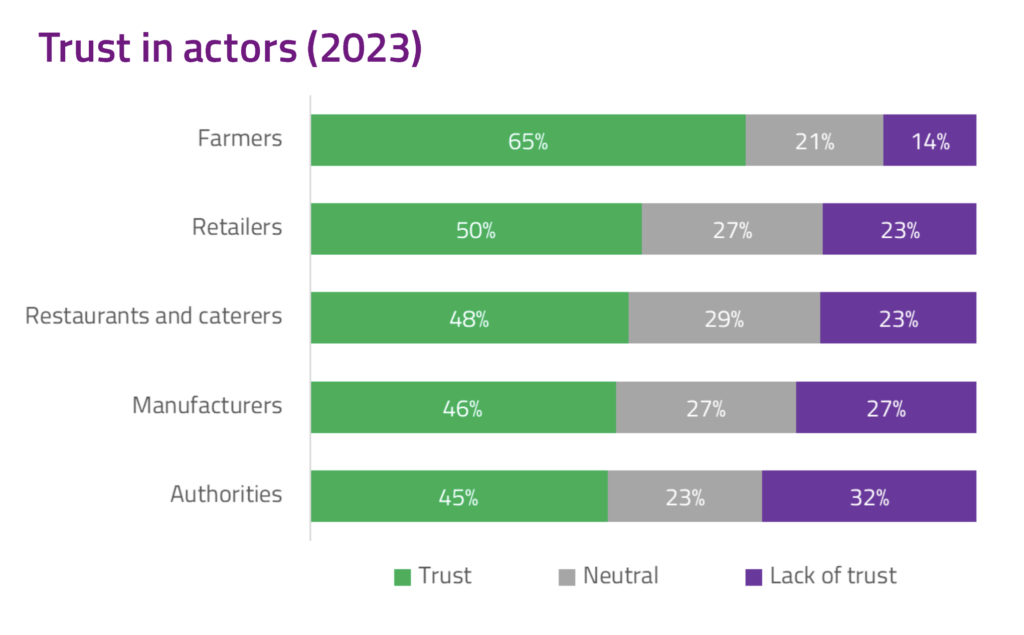
Europeans place the most trust in farmers, with 65% expressing confidence in them. As for all other actors in the food system, there’s a substantial gap to fill. Authorities are the least-trusted source (45%), behind manufacturers (46%), foodservice (48%) and retailers (50%). Overall, just 41% of respondents find that the food system is open about its practices, 43% think it cares about their opinions, and 53% find it competent.
The trust in farmers, though, is down from 67% in 2022, driven by a decline in beliefs about their competence. But not all farmers are equal, warns the report: small, local producers using eco-friendly methods are the most trusted, while industrial farmers are seen as the cause of many problems (they’re perceived as working against nature). Meanwhile, there’s a growing scepticism about livestock farmers and how they treat animals.
Meanwhile, Europeans see authorities as important, but not doing a good job. Only 42% feel they’re doing a good job, down from 45% in 2022. Moreover, just 37% think policymakers care about what the public thinks about food, and 38% believe they’re sufficiently open about how they regulate food.
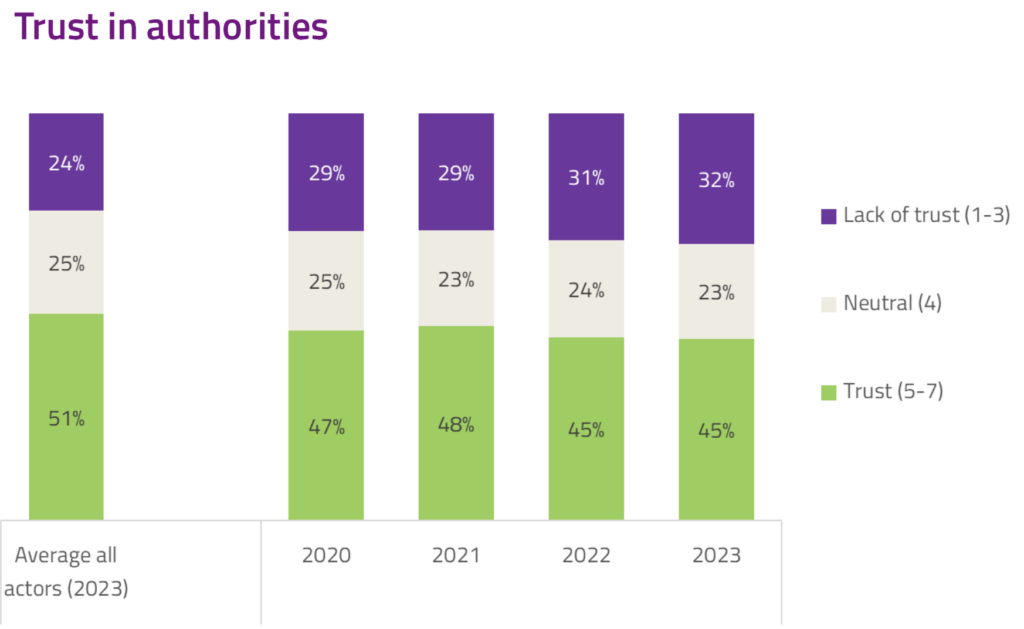
Some expressed concerns that specific regulations could be overly stringent, potentially encouraging a standardised approach to farming that may not be suitable for all regions. They mentioned the need for more flexibility to accommodate local, sustainable farming practices. This is relevant to the stringent regulations imposed on novel foods in the EU, which has driven food startups away from the region in search of more open markets.
Speaking of novel foods, restaurants and caterers are often the ideal first point of contact for these, as the risk of chefs preparing a bad meal is less than cooking something at home for the first time. This sector has the power to present new foods in an appealing manner via presentation and menu communication – this indicates they’re a great entry point for alternative protein companies.
“The food sector has faced unprecedented challenges in recent years, and will continue to do so as climate change takes its toll on food production,” Sofia Kuhn, director of public insights and engagement at EIT Food.
“Now, more than ever, we need partnership between the food sector and Europe’s citizens if we are to create a healthier and more sustainable food system for everyone. To achieve this, we need to understand and work with consumers to foster trust and engagement in embracing food innovations and making conscious choices about what to eat.”



